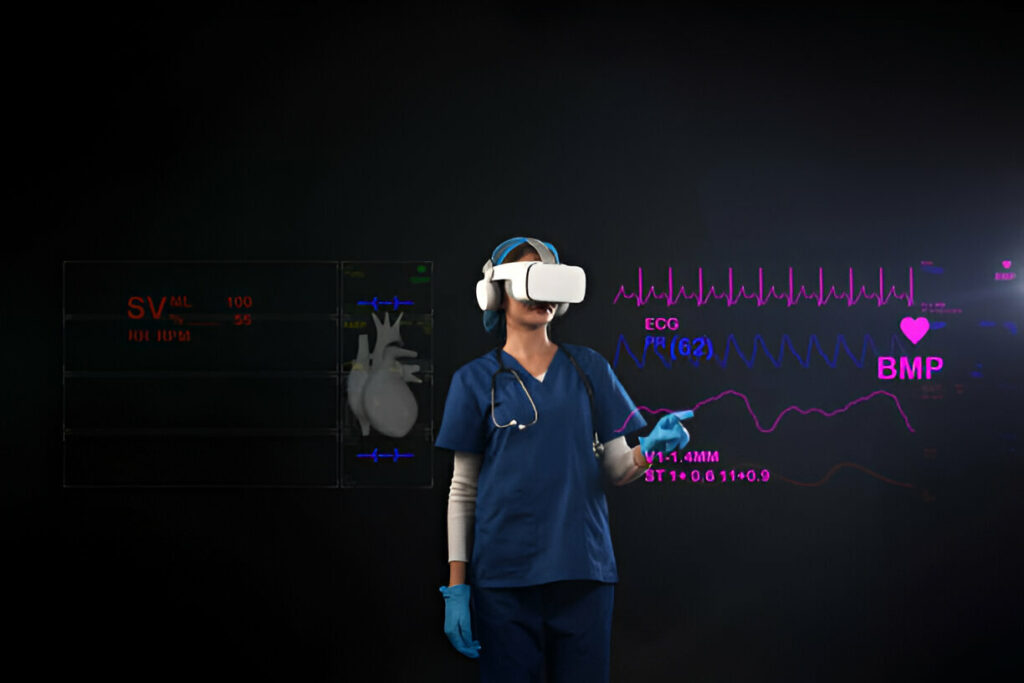Last Updated on March 11, 2025 by II Editor
Artificial Intelligence (AI) is revolutionising various industries, and healthcare is no exception. In the field of nursing, AI is transforming patient care, streamlining administrative tasks, and improving overall efficiency. As the demand for healthcare services increases, AI tools offer innovative solutions that help nurses provide better, faster, and more personalised care.
However, the integration of AI in nursing raises essential questions. What are the key AI technologies reshaping nursing? How can nurses leverage AI while maintaining patient-centred care? Will AI replace nurses, or will it enhance their capabilities? In this article, we explored the essentials of AI in nursing, covering its applications, benefits, challenges, and future implications.
The Role of Artificial Intelligence in Nursing
AI is designed to process vast amounts of data, identify patterns, and make predictions, ultimately assisting nurses in decision-making and patient care. The role of AI in nursing can be categorised into the following key areas:
1. Clinical Decision Support Systems (CDSS)
CDSS uses AI algorithms to analyse patient data and provide evidence-based recommendations. These systems help nurses make more informed decisions, reducing medical errors and improving patient outcomes. For instance, AI-driven CDSS can alert nurses about potential drug interactions, suggest treatment plans, and predict patient deterioration.
2. Predictive Analytics in Patient Care
AI-powered predictive analytics can identify patients at risk of complications before symptoms become critical. For example, machine learning models can analyse electronic health records (EHRs) to detect early signs of sepsis, pressure ulcers, or sudden cardiac arrest. Nurses can then intervene proactively, preventing serious health issues.
3. Automation of Administrative Tasks
Nurses spend a significant amount of time on documentation, scheduling, and patient data entry. AI can automate these tasks, reducing administrative burdens and allowing nurses to focus more on direct patient care. AI-powered chatbots, for example, can handle patient inquiries, appointment scheduling, and triage.
4. AI-Assisted Medical Imaging
AI enhances diagnostic accuracy by analysing medical images such as X-rays, CT scans, and MRIs. AI-driven image recognition technology can detect abnormalities like tumours, fractures, or infections faster and with greater accuracy than traditional methods. This assists nurses in prioritising urgent cases and ensuring timely interventions.
5. Robotic Assistance in Nursing
Robotics, powered by AI, are increasingly used in healthcare settings. Robotic systems can assist nurses in lifting and repositioning patients, reducing the risk of musculoskeletal injuries. Some AI-powered robots are also designed to provide companionship and basic care for elderly patients in nursing homes.
Benefits of AI in Nursing
The integration of AI into nursing offers numerous advantages, enhancing both efficiency and patient care.
1. Improved Patient Outcomes
AI-driven analytics provide nurses with real-time insights, enabling early detection of health risks. By identifying patterns in patient data, AI helps nurses take proactive measures, reducing hospital readmissions and complications.
2. Reduced Workload and Burnout
AI can handle repetitive and time-consuming tasks, reducing nurses’ workload. Automated documentation, AI-powered reminders, and virtual assistants allow nurses to focus more on patient interaction and clinical decision-making.
3. Enhanced Accuracy and Efficiency
AI minimises human errors by providing accurate, data-driven recommendations. Whether in medication administration, patient monitoring, or diagnostics, AI enhances precision, leading to better clinical outcomes.
4. Cost Reduction in Healthcare
By streamlining workflows and reducing hospital readmissions, AI helps healthcare institutions cut costs. Predictive analytics reduce unnecessary tests and procedures, optimising resource allocation.
5. Personalised Patient Care
AI enables personalised treatment plans by analysing individual patient data, genetics, and medical history. Nurses can tailor interventions based on AI-generated insights, ensuring patient-specific care.
Challenges and Ethical Considerations
While AI offers numerous benefits, its implementation in nursing also presents challenges and ethical concerns.
1. Data Privacy and Security
AI relies on vast amounts of patient data, raising concerns about confidentiality and security. Healthcare institutions must ensure robust data protection measures to prevent breaches and unauthorised access.
2. Dependence on Technology
Over-reliance on AI could reduce critical thinking and problem-solving skills among nurses. It is crucial to strike a balance between AI assistance and human judgement in patient care.
3. Potential Job Displacement
While AI aims to assist rather than replace nurses, automation may lead to job redundancies in certain administrative roles. Healthcare professionals must continuously adapt by acquiring new skills to stay relevant in an AI-driven landscape.
4. Bias in AI Algorithms
AI models are only as good as the data they are trained on. If the training data is biased, AI recommendations may disproportionately affect certain patient groups. Ethical AI development requires diverse and unbiased datasets.
5. Legal and Regulatory Compliance
AI in healthcare must comply with strict regulatory frameworks, such as the General Data Protection Regulation (GDPR) in Europe or the Health Insurance Portability and Accountability Act (HIPAA) in the United States. Ensuring compliance is essential to maintaining ethical AI use.
Future of AI in Nursing
As AI technology continues to evolve, its impact on nursing will only grow. The future of AI in nursing is expected to bring:
- Advanced AI-powered Wearables: Smart health monitoring devices will provide real-time patient data, allowing nurses to track patients remotely and detect early warning signs.
- Virtual Nursing Assistants: AI-driven chatbots and virtual assistants will offer 24/7 support, answering patient queries, providing medication reminders, and assisting with remote patient monitoring.
- AI-Powered Drug Administration Systems: AI will enhance medication management by predicting individual patient responses and optimising dosage accuracy.
- More Sophisticated Robotic Assistance: Robotic systems will expand their roles, performing routine nursing tasks and even assisting in complex procedures under nurse supervision.
Conclusion
Artificial Intelligence is undeniably transforming nursing, offering powerful tools that enhance efficiency, improve patient outcomes, and reduce administrative burdens. However, while AI provides numerous benefits, it must be implemented ethically and responsibly. Nurses must embrace AI as a supportive tool rather than a replacement, leveraging technology to provide high-quality, patient-centred care.
As the healthcare industry continues to evolve, nurses must stay informed about AI advancements, upskill accordingly, and adapt to an increasingly digitalised healthcare landscape. AI in nursing is not about replacing human touch—it is about augmenting human capability to deliver better, safer, and more personalised care.
By understanding and harnessing AI’s potential, nurses can position themselves at the forefront of a smarter, more efficient, and technologically advanced healthcare system.









